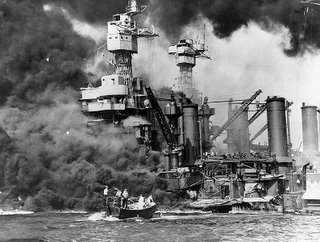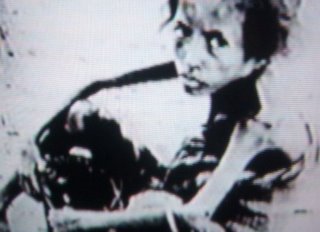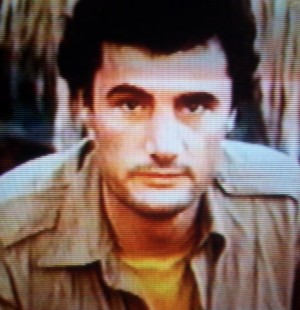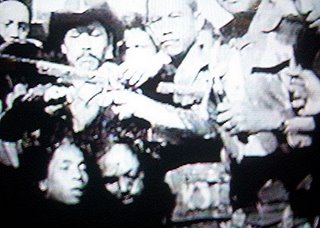A Day That Will Live In Infamy.
64 years ago, a growing fascist threat in Europe and Japan struck the United States, destroying large portions of our Navy, stationed in Pearl Harbor. President Franklin D. Roosevelt, in an address to the American People said, that this day, December 7th, 1941 will be a day that lives in infamy.

At 7:55 a.m., Sunday morning, Japanese fighter pilots destroyed and sunk five of the eight battleships docked at Pearl Harbor, and the remaining three were considerably damaged. On that day over 2,400 Americans paid the ultimate price in the service of their nation.
But it wasn’t just the United States that would look back on December 7th as a day of infamy. Thirty years ago, December 7th, 1975, Indonesia invaded and annexed East Timor. The next 24 years would see Indonesia slaughtering over 200,000 Timorese, a third of the total population, in one of the worse genocides of the 20th century.
But it wasn’t just the United States that would look back on December 7th as a day of infamy. Thirty years ago, December 7th, 1975, Indonesia invaded and annexed East Timor. The next 24 years would see Indonesia slaughtering over 200,000 Timorese, a third of the total population, in one of the worse genocides of the 20th century.

East Timor had been a Portugal colony since the 17th century, but in 1974 Portugal began to give up it’s colonial holdings. With an independent East Timor, President Gerald Ford and Secretary of State Henry Kissinger [pgs. 16-17] visited with Indonesia’s military dictator, General Suharto on December 6th, and approved of the Indonesian invasion. Worried that the invasion might cause some political embarrassment for President Ford, the administration requested that Suharto wait to invade until Ford had left. The next day President Ford left, after striking a deal with Suharto to give Indonesia all the weapons they needed for the annexation of East Timor.
 For women and children, the Indonesian forces often resorted
For women and children, the Indonesian forces often resortedto using starvation as a weapon against the domestic Timorese population.
As the invasion began, the Timorese attempted to bring the situation to the attention of the United Nations. Unfortunately, the United States made sure that no significant resolution would be passed to prevent the slaughter of the Timorese. The US ambassador to the United Nations, Daniel Patrick Moynihan later said, “The Department of State desired that the UN prove utterly ineffective in whatever measures it undertook: This task was given to me, and I carried it forward with no inconsiderable success.”
With the situation worsening in Timor, the Australian journalist Greg Shackleton made this report from East Timor, saying, “That’s all they want, for the United Nations to care about what is happening here.” The next day Greg Shackleton, and Australian journalists Gary Cunningham, Malcolm Rennie, Brian Peters, and Tony Stewart were all killed by Indonesian forces. Indonesia moved to start executing Timorese en masse. Washington doubled its military aid.
 Australian journalist Greg Shackleton
Australian journalist Greg Shackletonreporting from East Timor, for Channel 7 Melbourne,
the night before he was murdered by Indonesian forces.
16 years later, with the genocide continuing, two American journalists, Allan Nairn and Amy Goodman traveled to East Timor to report on a special delegation from the United Nations and Portugal to examine the situation in East Timor. Unfortunately, the United States pressured the delegation into not going, and Indonesian forces killed a young male named Sebastiao Gomes, who had taken refuge in Dili’s main Catholic church, the Moteal.
 Indonesia death squads would sometimes proudly deplay their kills.
Indonesia death squads would sometimes proudly deplay their kills.Here they gladly hold up the severed heads of two Timorese.
November 12th, 1991, two weeks after Gomes’ murder, a memorial mass was held at the Moteal, followed by the Timorese masses coming out into the street, demonstrating, in a land where public assembly had been forbidden for 16 years.
As the demonstration proceeded, more and more Timorese joined in, some 5,000 strong, all marching to the cemetery, where Timorese laid flowers upon Gomes’ grave. It wasn’t long before hundreds of Indonesian troops came toward them, marching with American-made M-16s drawn in front of them.
Journalists Amy Goodman and Allan Nairn, still there to report on the UN/Portuguese delegation that never came, was with the Timorese as the Indonesian forces approached. Hoping to act as a shield to protect the Timorese, Goodman and Nairn moved in front of the crowd, with microphones and cameras in full view, hoping that the sight of foreign journalists would prevent any violence.
Journalists Amy Goodman and Allan Nairn, still there to report on the UN/Portuguese delegation that never came, was with the Timorese as the Indonesian forces approached. Hoping to act as a shield to protect the Timorese, Goodman and Nairn moved in front of the crowd, with microphones and cameras in full view, hoping that the sight of foreign journalists would prevent any violence.
Allan Nairn recalled the events: “The soldiers marched straight up to us. They never broke their stride. We were enveloped by the troops, and when they got a few yards past us, within a dozen yards of the Timorese, they raised their rifles to their shoulders all at once, and they opened fire. The Timorese, in an instant, were down, just torn apart by the bullets. The street was covered with bodies covered with blood. And the soldiers just kept on coming. They poured in, one rank after another. They leaped over the bodies of those who were down. They were aiming and shooting people in the back. I could see their limbs being torn, their bodies exploding. There was blood spurting out into the air. The pop of the bullets, everywhere. And it was very organized, very systematic. The soldiers did not stop. They just kept on shooting until no one was left standing.”
Amy Goodman recalled: “A group of soldiers grabbed my microphone and threw me to the ground, kicking and punching me. At that point, Allan threw himself on top of me, protecting me from further injury. The soldiers then used their rifle butts like baseball bats, beating Allan until they fractured his skull. As we sat on the ground, Allan, covered in blood, a group of soldiers lined up and pointed their M-16s at our heads. They had stripped us of all of our equipment. We just kept shouting, ‘We’re from America!’ In the end, they decided not to execute us.”
The Santa Cruz massacre had only just begun. As the Timorese ran, the soldiers kept on firing, moving into the cemetery to shoot or beat those hiding behind graves. Inside the cemetery, Max Stahl, a filmmaker from Yorkshire TV caught all the carnage on tape. As the Indonesian soldiers moved into the cemetery, Stahl buried his videocassettes into a fresh grave. Minutes later he was arrested by Indonesian troops.
After nine hours of interrogation, Stahl, under the cover of night, went back for his videocassettes, and managed to successfully smuggle them out of the country. Amy Goodman and Allan Nairn was forced to leave the country and Allan had to seek medical care. Amy Goodman and Pacifica Radio told the story to the world.
After nine hours of interrogation, Stahl, under the cover of night, went back for his videocassettes, and managed to successfully smuggle them out of the country. Amy Goodman and Allan Nairn was forced to leave the country and Allan had to seek medical care. Amy Goodman and Pacifica Radio told the story to the world.
Finally, with public pressure building among some key activist groups within the United States, and indeed around the world, and worsening economic woes in Indonesia, General Suharto was forced to resign in 1998. His successor, BJ Habibie, reportedly under pressure from President Bill Clinton, called for a free election to be held in East Timor, for the Timorese to vote for independence. Despite that the vote was delayed twice, and Indonesian forces terrorized Timorese who wished to vote for independence, on August 30th, 1999 75% of the Timorese voted for Indonesia to end their occupation of East Timor.
After the election, the Indonesian military went on a rampage, kidnapping, murdering, and forcing mass evacuations of a third of the population from their homes. Aid workers, UN workers, and foreign diplomats became targets, forcing President Bill Clinton to cut off US military aid to the country in September.
As the Indonesians left, the UN took temporary control in the administration of the state. Finally, on May 20th, 2002, the Timorese flag was finally raised and UN Secretary General Kofi Annan officially handed over power to Timor’s first democratically elected president, Xanana Gusamo.
December 7th, indeed does live on as a day of infamy. But unlike the Japanese, those who committed the crimes of aggression and crimes against humanity have never been held accountable, and brought to justice. How long will the world be forced to wait, is anyone’s guess.
As the Indonesians left, the UN took temporary control in the administration of the state. Finally, on May 20th, 2002, the Timorese flag was finally raised and UN Secretary General Kofi Annan officially handed over power to Timor’s first democratically elected president, Xanana Gusamo.
December 7th, indeed does live on as a day of infamy. But unlike the Japanese, those who committed the crimes of aggression and crimes against humanity have never been held accountable, and brought to justice. How long will the world be forced to wait, is anyone’s guess.

4 Comments:
Well done. My admiration of Amy Goodman has increased two-fold.
So, because he writes about US history that you would prefer to ignore you accuse him of hate. (Chalk one up for redundancy radio.) Better still, you believe that because he criticizes the government (and rightly so) that he should leave the country.
Spoken like a supporter of totalitarian government.
Miami,
Either you are stupid or willfully ignorant because once again you show that you have difficulties with reading comprehension. I referred to you and you alone as one who would support a totalitarian government.
Leave it to you to lose you mind and start flailing about desperate to make more of the statement than what it is. By the way, the statement is all about you and your desire to enact the rules of a totalitarian government against Alva for what he wrote. It has nothing (zip, zero, nada) to do with the Bush administration, or your support of said administration.
And as it pertains to making my "whining relevant," it does appear that you have succeeded in making my "whining" more "relevant" by responding to three sentences with 7 paragraphs, some 21-25 sentences. Thanks.
Oh the irony!
Miami & Macdonald,
I will make one comment here, and one alone:
Read the quotes:
"To announce that there must be no criticism of the president, or that we are to stand by the president, right or wrong, is not only unpatriotic and servile, but is morally treasonable to the American public." - Teddy Roosevelt
perhaps Miami would prefer this:
"What good fortune for those in power that people do not think." - Adolf Hitler
Post a Comment
<< Home